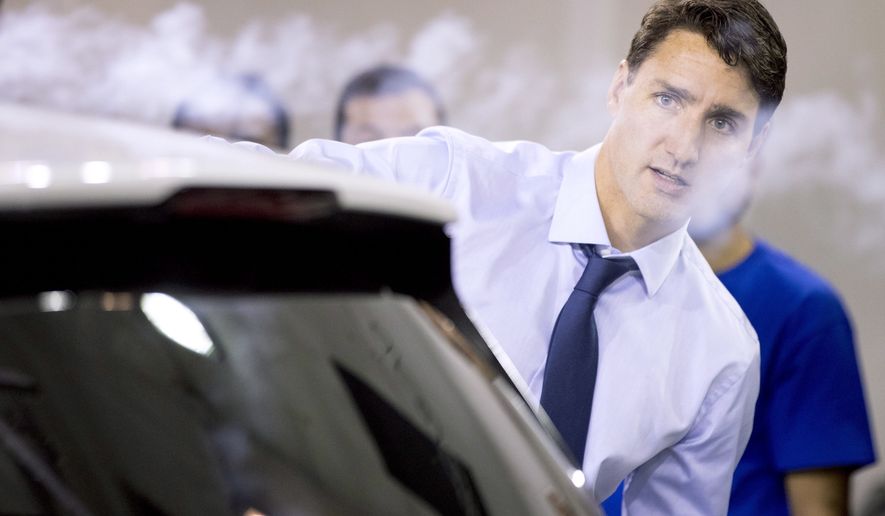President Trump’s off-the-record comment that he is not compromising in the U.S.-Canada trade talks appears to have tripped up the negotiations.
Facing a Friday deadline for Canada to join a new North American Free Trade Agreement, Ottawa balked after a report in the Toronto Star that the president said privately that he is forcing the country to accept the deal as is.
“Here’s the problem. If I say no — the answer’s no. If I say no, then you’re going to put that, and it’s going to be so insulting they’re not going to be able to make a deal … I can’t kill these people,” the president said of the Canadian government.
He also was quoted as saying the deal would be “totally on our terms.”
Mr. Trump said he wanted the remark to be “off the record” during an interview Thursday with Bloomberg News. The Toronto Star cited an anonymous source and claimed not to be bound by Bloomberg News’ agreement not to publish the comments.
The president confirmed the statement in a tweet as he railed against the betrayal of the agreement to keep the comments off the record.
Wow, I made OFF THE RECORD COMMENTS to Bloomberg concerning Canada, and this powerful understanding was BLATANTLY VIOLATED. Oh well, just more dishonest reporting. I am used to it. At least Canada knows where I stand!
— Donald J. Trump (@realDonaldTrump) August 31, 2018
Prime Minister Justin Trudeau’s government told the newspaper that the report appeared accurate and that Canadian officials did not believe the U.S. was bargaining in good faith.
Canadian Foreign Affairs Minister Chrystia Freeland emerged from a morning negotiating session saying they still didn’t have a deal.
“We are not there yet,” she told reporters in Washington.
Ms. Freeland said negotiatiors were “working hard” but that herteam was not satisfied that the deal was good for Canada.
She did not respond to a reporter who asked if she thought the U.S. was negotiating in good faith.
Mr. Trump set a Friday deadline for Canada to agree to join the U.S.-Mexico deal to replace the three-way NAFTA, which was announced Monday.
If Canada is out, Mr. Trump has threatened to submit the U.S.-Mexico deal to Congress and hit Canada with a 25 percent tariff on vehicles if Canada does not join the agreement.
Ms. Freeland said the negotiation would continue Friday.
“As has been the case from the very beginning, Canada is a country that is good at finding win-win compromises. Having said that, in trade negotiations [and] in this negotiation, we always stand up for the national interest,” she said. “And that is what we are going to continue to do. We are looking for a good deal, not just any deal, and we will only agree to a deal that is a good deal for Canada. We are not there yet.”
Members of Congress from both parties, as well as major U.S. business interests including automakers, want Canada included to preserve the more than $1 trillion in trade under the current trilateral agreement.
Without Canada, the new deal would face a more arduous path to ratification by Congress.
Replacing the 24-year-old NAFTA is a top priority of Mr. Trump, who calls the landmark trade agreement “the worst deal ever made.” The negotiations to rewrite the complex trade agreement have dragged on for a year.
Canada stayed on the sidelines this summer while the U.S. and Mexico executed the hard bargaining.
The U.S.-Mexico deal sought to end an exodus of manufacturing from the U.S., especially with automakers.
It would raise the minimum level of North American components in an automobile to qualify for tariff-free treatment under NAFTA from 62.5 percent to 75 percent.
The agreement also would boost wages for Mexican workers, keep agricultural products tariff-free, increase environmental standards in Mexico and overhaul rules for copyright and trade-dispute resolutions.
The agreement would last 16 years, with an opportunity to review it and adjust the terms after six years.
A major sticking point for Canada is that the deal eliminated the settlement system for anti-dumping disputes in Chapter 19 of NAFTA.
The U.S. wanted to nix the system and Mexico agreed, but Canada wants the mechanism to fight the Trump administration’s tariffs on softwood lumber, paper and other products.
Meanwhile, Mr. Trump wants Canada to end its tariffs on dairy products, which can run nearly 300 percent.
• S.A. Miller can be reached at smiller@washingtontimes.com.




Please read our comment policy before commenting.